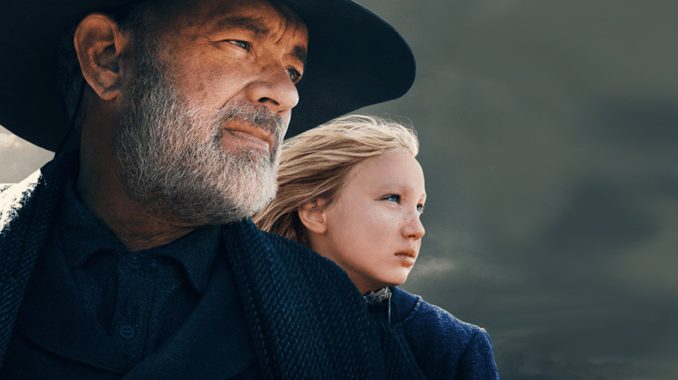
MPAA Rating: PG-13
USCCB Rating: A-III
Reel Rating: 3 out of 5 stars
It’s not news that news is on the decline.
Yet there was a time when news was so rare that whole communities would pay good money to hear a man stand and simply read headlines from around the world. Captain Kidd (Tom Hanks) is such a storyteller, who travels among the small towns of Texas in 1870 plying his skills for audiences in barns and stables. With echoes of the great Westerns of John Ford, News of the World beautifully captures this fraught period of American history, although its application to the news of today is a little haphazard.
As Kidd travels through the Lone Star state, the tension between the common man and the bluecoat Reconstruction officers of the North is still red hot. But Kidd is a veteran of the Confederate infantry, which makes him a man of honor and welcomed throughout the land. It is a solitary lifestyle filled with cheap hotels, hours of silence on the road, and constant danger from renegade Indians and Texans alike.
On one such trip, he comes across an abandoned young girl named Johanna (Helena Zengel) whose Black escort was lynched by a mob. Kidd learns that the poor girl was twice orphaned. First, when the local Kiowa tribe murdered her family; second, years later, when the Kiowas themselves were killed and she recovered. Like Kidd, she is homeless both in the literal and metaphorical sense. Neither the government nor the locals seem to care, so Kidd takes it upon himself to return her last blood relatives.
They embark on an Orphean odyssey through the best and worst of humanity. Kidd must recover his battle instincts when a group of psychopaths try to rape Johanna. He battles dust storms, broken axles, dehydration, and his own personal demons from the past. He also has a chance encounter with Johanna ’s tribe, who provide the pair with a much-needed horse. At first, Joana tries to return to her Native American ways but soon understands that this is impossible.
Kidd is entrusted with bringing and sharing information of the outside world. However, then as now, the news comes through the lens of its author and, sometimes, its messenger. In one town, the authoritarian mayor demands Kidd read from his own artificial newspaper, filled with lies designed to promote the mayor’s horrific actions. Kidd refuses, and his reading from a different account leads to an insurrection.
This could apply equally to any source of propaganda, but in the context of today it seems directly attributed to conservative sources. The fake newspaper disparages African Americans, boldly champions killing buffalo for only their skins, and glorifies the mistreatment of workers. Criticism of far-right political punditry is certainly reasonable, but coming from a mainstream Hollywood production through the lips one of its most famous Democratic stumpers rings quite hollow. It’s an all too easy and stereotypical target.
A more sophisticated parallel and analysis of our current political climate is found in the tensions between political factions following the Civil War. Many Texans, still upset at their loss, heckle Kidd when he reads a statement from President Grant. The Union soldiers trying to enforce Reconstruction are equally uncomfortable, going through the motions while wishing they were home with their families. For himself, Kidd does not trust the new Northern authorities, nor does he show enthusiasm for the Southern cause he helped defend. Like most humans, he just wants to “get by”.
In the end, it is personal responsibility and kindness that save Kidd and Johanna, not governmental regulations or ideological purity. The waves of history churn up and down, but it is the common man that so often keeps the boat steady.
Ultimately, this is a story not of history but of the relationship between a man and a young woman. It is unclear who really ought to raise Johanna. When she is finally returned to her German-American relatives, they are totally unprepared for her unique difficulties. Kidd then volunteers to raise her as his own. His nomadic lifestyle and simple goodness prove to be the medicine needed to heal her soul. As a newsman, he is firmly situated in the world—even loves the world—but as a man of character he is clearly not of it. This is a sorely needed lesson for our times.
If you value the news and views Catholic World Report provides, please consider donating to support our efforts. Your contribution will help us continue to make CWR available to all readers worldwide for free, without a subscription. Thank you for your generosity!
Click here for more information on donating to CWR. Click here to sign up for our newsletter.




A western that grapples with fake news? I’ll pass.
Hollywood butchered the book to fit their causes. Read the book for better entertainment, more accurate history, and less race baiting.
I am so glad they made a movie of this. It was one of the best novels I had read a couple of years back. A great story.